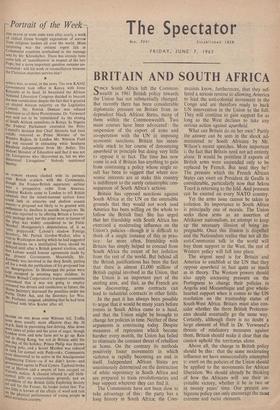BRITAIN AND SOUTH AFRICA
Q INCE South Africa left the Common- LI wealth in 1961 British policy towards the Union has not substantially changed. But recently there has been considerable diplomatic pressure on Britain from in- dependent black African States, many of them within the Commonwealth. Two main courses have been advocated : the suspension of the export of arms and co-operation with the UN in imposing economic sanctions. Britain has mean- while stuck to her course of denouncing apartheid in principle but doing very little to oppose it in fact. The time has now come to ask if Britain has anything to gain from continuing a policy whose single re- sult has been to suggest that where eco- nomic interests are at stake this country is indifferent to the surely catastrophic con- sequences of South Africa's actions.
Britain has opposed sanctions against South Africa at the UN on the ostensible grounds that they would not work (and America has been willing on the whole to follow the British line). She has urged that her friendship with South Africa has exercised a moderating influence on the Union's policies—though it is difficult to think of a single instance of this in prac- tice : far more often, friendship with Britain has simply helped to conceal from South Africa the extent of her isolation from the rest of the world. But behind all the British justifications has been the fact that there is almost £1,000 million of British capital involved in the Union, that the Union is an important part of the sterling area, and that, as the French are now discovering, arms contracts can lead to industrial contracts in other fields.
In the past it has always been possible to argue that it would be many years before events in South Africa came to a head, and that the Union might be brought to change her policies in time. Neither of these arguments is convincing today. Despite measures of repression which become harsher every month, the Union has failed to eliminate the constant threat of rebellion at home. On the contrary its methods positively foster movements in which violence is rapidly becoming an end in itself. Independent African States are unanimously determined on the destruction of white supremacy in South Africa and are prepared to train revolutionaries and buy support wherever they can find it.
The Communists have not been slow to take advantage of this: the party has a long history in South Africa; the Com-
munists know, furthermore, that they suf- fered a serious reverse in allowing America to lead the anti-colonial movement in the Congo and are therefore ready to back UN intervention in the Union to the full. They will continue to gain support for as long as the West declines to take any serious action against apartheid.
What can Britain do on her own? Partly the answer can be seen in the shock ad- ministered to South Africans by Mr. Wilson's recent speeches. More important i3 the fact that Britain need not act entirely alone. It would be pointless if exports of British arms were suspended only to be replaced by French. But need they be? The pressure which the French African States can exert on President de Gaulle is considerable, particularly now that Sekou Toure is returning to the fold. And pressure can be exerted on every NATO country.
Yet the arms issue cannot be taken in isolation. Its importance to South Africa is principally one of morale. The Union seeks these arms as an assertion of Afrikaner nationalism, an attempt to keep up the necessary illusion of being im- pregnable. Once this illusion is dispelled and the Nationalists realise that not all the anti-Communist talk in the world will buy them support in the West, the rest of Western policy will fall into place.
The urgent need is for Britain and America to establish at the UN that they oppose apartheid in fact quite as much as in theory. The Western powers should also apply unceasing pressure on the Portuguese to change their policies in Angola and Mozambique and give whole- hearted support when it comes to the UN resolution on the trusteeship status of South-West Africa. Britain must also con- sider whether the three British Protector- ates should eventually go the same way. Certainly, although there is no doubt a large element of bluff in Dr. Verwoerd's threats of retaliatory measures against them, Britain should make it clear that she cannot uphold the territories alone.
Above all, the change in British policy should be this : that the same moderating influence we have unsuccessfully attempted tc, exert on the policies of the Union should be applied to the movements for African liberation. We should already be thinking of how the Africans will use their in- evitable victory, whether it be in two or in twenty years' time. Our present am- biguous policy can only encourage the most extreme and racist elements.










































 Previous page
Previous page